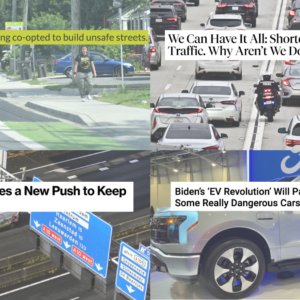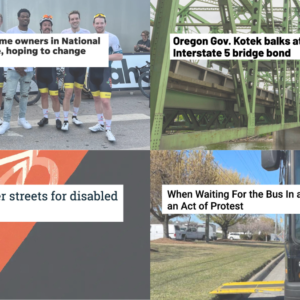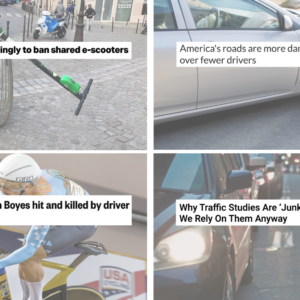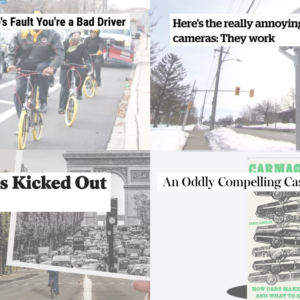Welcome to the week. Here are the most notable stories our writers and readers have come across in the past seven days…
E-bike incentives: The Washington legislature has passed a law that will devote $7 million to e-bike rebates and to promote e-bike lending libraries. (Bicycle Retailer & Industry News)
Reversing course: Very interesting debate playing out in this city near Los Angeles whose city council voted to remove dedicated bus and bike lanes to appease people concerned about auto traffic congestion. (Fox LA)
Secretary Pete on a pod: Don’t miss a solid interview about transportation policy and traffic safety with U.S. Secretary of Transportation Pete Buttigieg. (Vox)
Cycling and grief: An 84-year old woman plans to ride 1,000 miles across Scotland to help cope with the “unbearable” grief of outliving her three children. (BBC)
Sending a signal: You will be more grateful for Portland’s very bike-friendly traffic signals after reading this op-ed about how signals in Los Angeles are (still) tilted toward drivers. (LA Times)
Sleeping with the enemy: Washington’s nonprofit Cascade Bicycle Club has entered into a financial partnership with Honda where the automaker helps sponsors their programs and gives the bike advocacy group a free truck. (Bicycle Retailer & Industry News)
Auto industry doesn’t care about you or the planet: The fact that a moderately priced, popular, small electric car will be discontinued while massive ones proliferate is just the latest evidence that the auto industry is out of control and needs more regulation. (CNBC)
Race to zero: The stats around who dies and who lives around the most dangerous streets show a troubling and unacceptable connection to America’s legacy of systemic racism. (NY Times Opinion)
Buttons are best: Touchscreens on car displays are a huge safety risk so it’s great to see automakers responding to criticisms and returning to more buttons and dials. (Slate)
Thanks to everyone who shared links this week.








Thanks for reading.
BikePortland has served this community with independent community journalism since 2005. We rely on subscriptions from readers like you to survive. Your financial support is vital in keeping this valuable resource alive and well.
Please subscribe today to strengthen and expand our work.
This web site incessantly editorialized that “electric vehicles won’t save us” but now has the gall to mourn the impending loss of the Bolt EV (and the Leaf EV). Perhaps lighter-weight EV automobiles should have been supported as a better option than the stupid utilty vehicles that the blog owner and many activists/advocates drive.
As the article pointed out, the vehicles did not sell well. Blame consumers. Or blame new government rebates that do not incentivize smaller vehicles. GM will build the cars it can sell, just like any other business.
I’m sure the battery recall on the Bolt had an effect on sales. Nobody wants to buy a car that could explode in their driveway.
Tesla owners would beg to differ.
Funny how the very rare exploding batteries get so much attention (which harms public opinion of energy storage as well) even though gas stations and ICE cars blow up far to frequently.
https://electrek.co/2022/01/12/government-data-shows-gasoline-vehicles-are-significantly-more-prone-to-fires-than-evs/
It is a sad state of affairs. And it is tough to sell cars when trying to reverse [battery fire] headwinds that make many a garage owner / operator prohibit Bolts from parking inside garages. Its common to see No Bolt signs at many a garage structure in Honolulu.
https://insideevs.com/news/629487/us-chevrolet-bolt-ev-euv-sales-2022q4/
Those are rookie numbers. Tesla sold nearly half a million cars in the US last year:
https://insideevs.com/news/652873/tesla-tops-bmw-us-luxury-car-sales-2022/
Electric vehicles won’t save us, and it’s unfortunate that these two small EVs won’t be available. There’s nothing unusual or contradictory about believing both statements. “More traffic enforcement won’t save us, but it’s too bad there’s not more of it”, “Better bus service won’t save us, but it’s too bad TriMet ended those routes”…there are so many similar examples.
The problem with “electric vehicles won’t save us” content is that its invariably associated with arguments that they are worse than ICE vehicles.
No? At least the times I’ve heard this refrain it’s been from people who acknowledge they are slightly better than ICE vehicles in some aspects but still suffer from other problems with cars.
QED
“suffer from other problems” does not imply “worse than”, come on.
Yeah….they are very slightly better and also have all of these other problems.
(Real problems exist but describing battery electrification of transportation as just “slightly” better is akin to carrying water for Exxon.)
It’s occasionally associated with arguments that they are worse than ICE vehicles–certainly not “invariably”.
Most commonly people saying “electric vehicles won’t save us” argue that they’re better than ICE vehicles, but not as much better than what their proponents claim. That’s also what Max said in his comment. It’s the opposite of what you said, so I don’t understand why you believe it proves your point.
Yeah, the United Nations climate science consensus is just wrong.
Sending a signal:
Every time I visit California for work I’m reminded of how much better it is here being outside of a car. If I can make it work I’ll forgo renting one and even when I do I still try to walk to my destinations outside of work.There’s not a lot of people walking to a Walmart (the closest grocery store) crossing 12 lanes at intersections in Tustin. In fact I’m pretty sure it was just me.
That being said PBOT can still improve. In fact, lately I’ve found my commute home from work to be less smooth because of changes PBOT has been making to the light timing. The most specific example is the timing along Hawthorne. Before you used to be able to catch all the lights from the bridge to Ladds but now the changes make it so your approach to 7th is really slow like 8 mph max or you have to stop. 11th and 12th are also weird and inconsistent. Occasionally I can book it down Hawthorne and make the light at 12th but more often than not the 11th light doesn’t turn green in time to make it the one block to 12th before it changes red. I’ve noticed a lot more cyclists running the red now because of it. I take 11th to Clay when the timing is off.
PBOT has also been messing with the timing at other lights along their greenways. They seem to have abandoned their goal of pedestrians getting to cross every minute along greenways in favor of cars. Now it’s more like 50-70 seconds after the light turns red before it becomes green again. Before the whole cycle would take 60 seconds with 15 of that for greenway traffic to cross. Of course all of that goes out the window at ODOTs highways like 82nd or Powell.
PBOT really screwed up Hawthorne with its signal timing changes. I’ve basically given up riding the street because it is so much slower than it used to be.
Eugene, like most US cities, still has ATSAC- like signal practices, most hazardously on its one-way arterial couplets. 6th & 7th Aves are timed at 5 mph over the speed limit, & most traffic goes 10-15 mph over, so they end up stopping at red lights anyway. It seems like that’s how the MLK & Grand couplet in Portland is timed, too, but I certainly haven’t driven it often enough to be sure. That’s a particularly stupid thing about ATSAC-like timing, which has been standard practice for the last 40 years: it doesn’t even work that well for cars, because reducing friction for drivers will just make them drive faster, & they’ll just find a bottleneck somewhere down the road (often the bottleneck is them crashing or running over a pedestrian).
With GM / Chevy retreating from the Bolt EV (such a great name) this just leaves more room for Chinese (and other new OEM countries, like India) to enter the market at the bottom smaller end. It may be like the late 1950s (VW/ Fiat) / early 1960s (Japan) all over again.
Already happening.
https://apnews.com/article/china-electric-car-ev-technology-byd-c7fda57fb0f761c637a71f9f9e7d8b67
https://ev-database.org/car/1782/BYD-ATTO-3
200mi range and a curb weight just north of 4,000lbs, and it would likely be in the mid $30k range, based on the sale price in Australia right now. Even with no tax credit, that would be compelling for a lot of people.
Vox: How Pete Buttigieg wants to make America’s roads safer … for car drivers.
Half the interview was about public transit if you bothered to read it….Of course the Transportation secretary wants to make car driving and roads safer.
What is your point or is this just a Fox news critique you had to post?
I did in fact read it for content. He wants people to use public transit to expand roadway capacity for cars, to reduce car congestion, etc. Nothing about making it safer for walkers and bicyclists, at least in the portion of his interview written up by Vox.